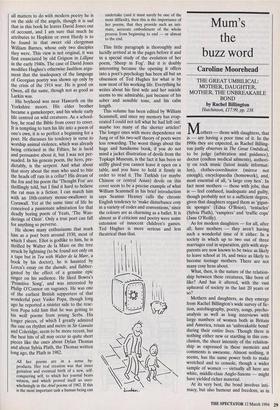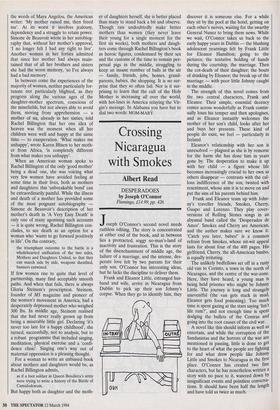Mum's the buzz word
Caroline Moorehead
THE GREAT UMBILICAL: MOTHER, DAUGHTER, MOTHER, THE UNBREAKABLE BOND by Rachel Billington Hutchinson, £17.99, pp. 238 Mothers — those with daughters, that is — are having a poor time of it. In the 1990s they are expected, as Rachel Billing- ton justly observes in The Great Umbilical, to be judge (arbitration and guidance), doctor (endless medical ailments), authori- ty on rock music (latest inside informat- ion), clothes-coordinator (mirror not enough), encyclopaedia (homework), and, most essential of all, 'a large cosy hen'. In fact most mothers — those with jobs, that is — feel confused, inadequate and guilty, though probably not to a sufficient degree, given that daughters regard them as 'gigan- tic sponges' (Edna O'Brien), 'tentacles' (Sylvia Plath), 'vampires' and 'traffic cops' (Jane O'Reilly).
As for modern daughters — for all, after all, have mothers — they aren't having such a wonderful time of it either. In a society in which up to two out of three marriages end in separation, girls with step- parents are now known to be twice as likely to leave school at 16, and twice as likely to become teenage mothers. There are not many cosy hens about.
What, then, is the nature of the relation- ship between these creatures, like born of like? And has it altered, with the vast upheaval of society in the last 20 years or so?
Mothers and daughters, as they emerge from Rachel Billington's wide survey of fic- tion, autobiography, poetry, songs, psycho- analysis as well as long interviews with large numbers of women both in Britain and America, retain an 'unbreakable bond' during their entire lives. Though there is nothing either new or startling in this con- clusion, the sheer intensity of the relation- ship as expressed in these memoirs and comments is awesome. Almost nothing, it seems, has the same power both to make wretched and to console, though a wider sample of women — virtually all here are white, middle-class Anglo-Saxons — might have yielded richer material.
At its very best, the bond involves inti- macy, but also humour and freedom, as in the words of Maya Angelou, the American writer: 'My mother raised me, then freed me'. At its worst it involves jealousy, dependency and a struggle to retain power. Simone de Beauvoir wrote in her autobiog- raphy that, without her mother's approval, `I no longer felt I had any right to live'. Another woman in her forties admitted that since her mother had always main- tained that of all her brothers and sisters she had the worst memory, 'so I've always had a bad memory'.
In between come the experiences of the majority of women, neither particularly for- tunate nor particularly blighted, as they progress along the various ages of the daughter-mother spectrum, conscious of the minefields, but not always able to avoid them, moving from apprehension — a mother of six, already in her sixties, told Rachel Billington that her one idea of heaven was the moment when all her children were well and happy at the same time — to exasperation. 'What makes me unhappy', wrote Karen Blixen to her moth- er from Africa, 'is completely different from what makes you unhappy'.
When an American woman spoke to Rachel Billington of the only 'good mother' being a dead one, she was voicing what very few women have avoided feeling at some time in their lives, both as mothers and daughters: this 'unbreakable bond' can be extraordinarily painful. While the illness and death of a mother has provided some of the most poignant autobiography Simone de Beauvoir's description of her mother's death in 'A Very Easy Death' is only one of many agonising such accounts — it is quite wrong, Rachel Billington con- cludes, to see death as an option for a woman who 'wants to go forward positively in life'. On the contrary,
the triumphant outcome to the battle is a wholehearted unification of the two sides, Mothers and Daughters United, so that they can march side by side, weapons sheathed, banners entwined.
If few women rise to quite that level of partnership, many find acceptably smooth paths. And when that fails, there is always Gloria Steinem's prescription. Steinem, founder of MS magazine and pioneer of the women's movement in America, had a desperately depressed mother who weighed 300 lbs. In middle age, Steinem realised that she had never really grown up from being a miserable little girl. Declaring 'it's never too late for a happy childhood', she turned, successfully, not to analysis, but to a robust programme that included singing, meditation, physical exercise and a 'confi- dence clinic'. Singing one's way out of maternal oppression is a pleasing thought.
For a woman to write an unbiased book about mothers and daughters would be, as Rachel Billington admits,
as if a foot soldier in Queen Boudicca's army were trying to write a history of the Battle of Camulodonum.
But happy both as daughter and the moth- er of daughters herself, she is better placed than many to stand back a bit and observe. Though rats undoubtedly make better mothers than women (they never leave their young for a single moment for the first six weeks), both mothers and daugh- ters come through Rachel Billington's book as heroic figures, condemned by their sex and the customs of the time to remain per- petual pigs in the middle, struggling to keep an insane number of balls in the air — family, friends, jobs, homes, grand- parents, babies, the shopping. It is no sur- prise that they so often fail. Nor is it sur- prising to learn that the cult of the Holy Mother is increasing all over the world, with hot-lines in America relaying the Vir- gin's message. In Alabama you have but to dial two words: MOM-MARY.



















































 Previous page
Previous page